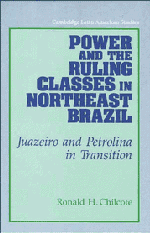Book contents
- Frontmatter
- Contents
- List of tables and figures
- Preface
- PART I THE TRADITIONAL SERTÃO
- 1 The background
- 2 The structure of power and the ruling class
- 3 Juazeiro: cohesion and factionalism
- 4 Petrolina: patriarchy and family dominance
- 5 The ruling class and the polity
- 6 The ruling class and the economy
- 7 The ruling class in civic and social life
- 8 Ideology
- 9 Development and underdevelopment
- 10 Participation, mobilization, and conflict
- PART II THE SERTÃO REVISITED
- Appendix
- Bibliography
- Index
- CAMBRIDGE LATIN AMERICAN STUDIES
6 - The ruling class and the economy
from PART I - THE TRADITIONAL SERTÃO
Published online by Cambridge University Press: 30 September 2009
- Frontmatter
- Contents
- List of tables and figures
- Preface
- PART I THE TRADITIONAL SERTÃO
- 1 The background
- 2 The structure of power and the ruling class
- 3 Juazeiro: cohesion and factionalism
- 4 Petrolina: patriarchy and family dominance
- 5 The ruling class and the polity
- 6 The ruling class and the economy
- 7 The ruling class in civic and social life
- 8 Ideology
- 9 Development and underdevelopment
- 10 Participation, mobilization, and conflict
- PART II THE SERTÃO REVISITED
- Appendix
- Bibliography
- Index
- CAMBRIDGE LATIN AMERICAN STUDIES
Summary
In his classic analysis of the colonial period, Caio Prado Júnior notes the following characteristics of the Brazilian economy:
Firstly, its structure, as an organ of production set up solely as such and with a few entrepreneurs and administrators who ran everything, and the great mass of the population who served as the labor force; secondly, its function as the supplier to international trade of the commodities needed; and finally, its evolution. a consequence of the two foregoing features, as an extensive and purely speculative exploitation, unstable in time and space, of the country's natural resources.
He attributes the backwardness of Brazil to the colonial ties to Portugal and Europe. Portuguese administrative practices were oriented to enriching the trade of the mother country while repressing any colonialist effort to start up manufacturing industry or other enterprises. Thus, the colony's economic evolution was subject to a series of cycles resulting in “a successive development and decline of one after another of all the country's areas of concentrated settlement.” The economy, he believed, rested on uneasy foundations, and there was no “organized system of production and distribution of resources for the material subsistence of the population.” At times there was an illusory impression of wealth and prosperity: “As soon as the particular combination of circumstances changed or the available natural resources were exhausted, production declined and withered away, making it impossible to maintain the life it had sustained.”
One of these cycles affected the sugar industry of the Northeast, which prospered in response to the worldwide demand for sugar during the sixteenth and seventeenth centuries and declined thereafter.
- Type
- Chapter
- Information
- Power and the Ruling Classes in Northeast BrazilJuazeiro and Petrolina in Transition, pp. 141 - 176Publisher: Cambridge University PressPrint publication year: 1990



